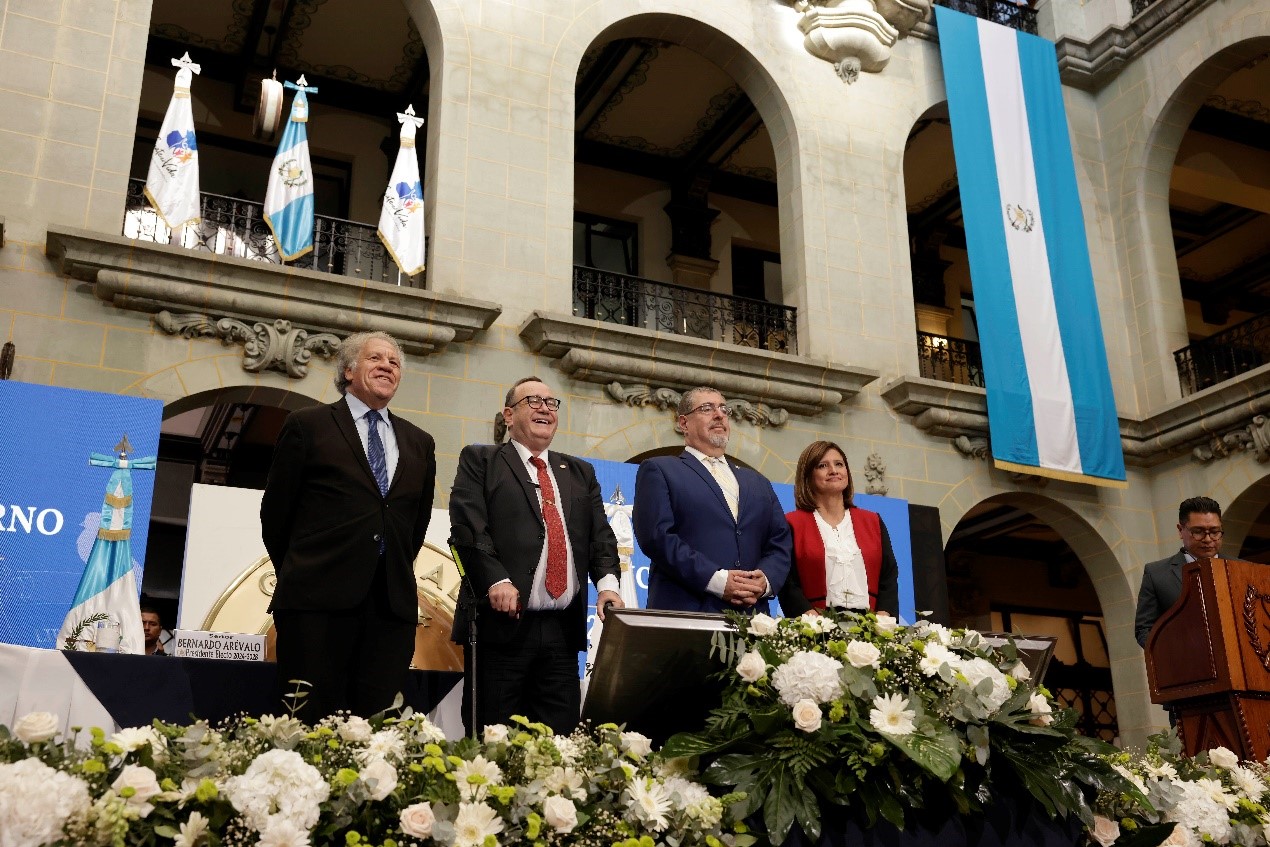What Guatemala’s Political Instability Post 2023-Elections Could Mean for Taiwan?
In recent years, most times a diplomatic ally of Taiwan has held elections, speculation about changing recognition has emerged and backdoor maneuvers by Beijing increased. So far Guatemala seems to be following a similar script.
Picture source: Gobierno de Guatemala, September 11, 2023, Flickr, https://www.flickr.com/photos/guatemalagob/53181335526/.
Prospects & Perspectives No. 56
What Guatemala’s Political Instability Post 2023-Elections Could Mean for Taiwan?
By Shiany Pérez-Cheng
In recent years, most times a diplomatic ally of Taiwan has held elections, speculation about changing recognition has emerged and backdoor maneuvers by Beijing increased. This was the case of Solomon Islands facing elections in April 2019, where opposition candidate Rick Hou prosed a review of relations between Honiara and Taipei if elected; then, newly elected Prime Minister Sogavare announced a 100-day period to make a final decision. A few months later, the Solomon Islands officially changed recognition to the People’s Republic of China amid accusations of checkbook diplomacy.
More recently, before the November 2021 elections in Honduras, Xiomara Castro stated she would open diplomatic and commercial relations with China if she won the elections. Her team initially backtracked after she won, declaring the new government was not going to break ties with Taipei. There was no imminent change in the relationship with Taiwan, as had just happened in Nicaragua in December. And although vice president Lai Ching-te attended president-elect Castro inauguration in Tegucigalpa on January 2022, where he presented her with a donation of supplies for COVID prevention, less than a year later Honduras did a dramatic U-turn and switched recognition to China.
So far Guatemala seems to be following a similar script. Reformist candidate Bernardo Arévalo said the country must establish a foreign policy following its own interests, and that in the case of the PRC it is necessary to work and expand commercial relations. He added that the intention is to maintain good political relations both with China and Taiwan, within a mutual respect framework. His opponent, former First Lady Sandra Torres, announced she would strengthen economic and trade ties with Taipei, and proposed the creation of an economic free zone to attract investment from the Asian country. Political instability after presidential elections is not easing concerns about whether the government of president-elect Arévalo will decide to keep diplomatic relations with Taiwan or change recognition to China.
The Guatemala elections and their aftermath
In the June presidential elections, no candidate obtained over 50% of the vote in the first round, and a second runoff between Bernardo Arévalo and Sandra Torres was called. But there was a delay on the certification of the results by the Supreme Electoral Tribunal, as several political parties challenged the results and the Constitutional Court went forward with the appealing. President Alejandro Giammattei’s party was among those. The second vote count did not result in significant changes in the result, but three political parties filed for another legal proceeding which sought to count vote by vote. This new recount was supported by the Supreme Court president, who unilaterally asked the Supreme Electoral Tribunal for reports to resolve the admissibility of the recount; this proceeding delayed the certification of results.
Taiwan’s Ministry of Foreign Affairs said it hoped all parties would resolve their disputes through democratic processes and the rule of law, while reiterating respect for the integrity of Guatemala's institutions and the will of its people.
After a new review of the electoral records, the results were confirmed, and the second round was authorized. The final elections were held on August 20, and as reformist Bernardo Arévalo was elected, his political party was suspended, and a political crisis ensued. The attorney general ordered her magistrates to break into the Supreme Electoral Tribunal to seize the electoral records containing the results of the elections, which provoked clashes with the tribunal officers. Guatemalans took the streets to protest the seizure and to demand the attorney general’s resignation, leading to confrontations between protesters and the police. After two weeks of demonstrations, the situation worsened when a man was killed by an armed commando who opened fire on protesters.
China’s influence operations against Guatemala
After Honduras changed recognition to China in March, Beijing focused on Guatemala by implementing tactics such as stepping up pressure with a media campaign using Guatemala’s domestic dissatisfaction to turn the public opinion against maintaining diplomatic relations with Taiwan.
On April 1, China Central Radio and CGTN recorded a series of interviews with people from all walks of life in Guatemala, pushing the narrative on how upholding Beijing’s “one China” principle was the general trend. Chinese media spoke with left-wing parties during a campaign launch ceremony, during which the candidates pointed out that Guatemala’s relationship with Taiwan had caused internal conflicts in the country, and how by not establishing diplomatic relations with China, the government was limiting itself and restricting relations with one of the most relevant global powers. China’s state-controlled media also interviewed the chairperson of the China-Guatemala Chamber of Commerce and Cooperation, who explained how Chinese history tells everyone that there is only one China in the world, and how history also shows that any attempt to split the country will not end well. The opinions of a Guatemalan systems engineer were also recorded: he condemned Taiwan’s “bribe diplomacy” and praised the technological and market advantages demonstrated by Chinese brands such as Huawei and BYD.
CGTN also collaborated with Guatemala’s CANAL+, marking the first time a CGTN reporter recited Chinese government propaganda on a Guatemalan TV program. She presented the Taiwan issue as the core of Beijing’s key interests, adding that Beijing’s “one China” principle was supported by most countries around the world. CGTN’s Spanish-language channel was also able to reach a wide regional audience through other mainstream media such as the Latin American News Alliance and Venezuela’s Southern Television. Similar interviews were also broadcast by CGTN in Guatemala through April, timed with President Tsai Ing-wen’s visit to diplomatic allies in the region later the same month.
After the August elections, China’s Ministry of Foreign Affairs spokesperson Wang Wenbin referred the above-mentioned interview with Guatemalans from various walks of life and quoted verbatim their eager hope that the country would establish diplomatic relations with China and allegedly demonstrating that developing relations were aligned with Guatemala’s fundamental interests and the aspiration of its citizens. He also said the PRC hoped the new government would make a “correct decision” regarding Beijing’s “one China” principle, adding that this would serve the country’s fundamental long-term interests and the well-being of its citizens.
Right after Guatemala’s second round and final elections, the Central American Parliament decided to admit China as an observer, expelling Taiwan. The Parliament headquarters are in Guatemala City, and it brings together parliamentarians from Guatemala, Honduras, El Salvador, Nicaragua, Panama and the Dominican Republic, all members but Guatemala are former Taipei diplomatic allies who had recently changed recognition to Beijing. The resolution was promoted under Nicaragua president Daniel Ortega influence and reflects increasing authoritarian governments’ inroads in Latin America, which suits China’s interests in the region while diminishing U.S. influence in its backyard. The decision stated that the Central American Parliament respects international law and recognizes the United Nations as the highest expression of said international law, therefore must abide by UN resolutions. Accordingly, the Parliament stated that Taiwan’s observer status had been revoked as per the “one China” principle adopted in 1971 by the UN General Assembly Resolution 2758. This reasoning echoes China’s disinformation campaign: the resolution only recognizes the PRC as the sole legitimate representative of China in the UN and expels Chiang Kai-shek representatives, but neither addresses nor settles sovereignty over Taiwan.
Taipei strongly denounced what it called a flagrant attack by Managua and Beijing that substantially harms its rights and position in the Central American Parliament and accused Ortega of being subservient to the PRC by distorting UNGA Resolution 2758. It is worth noting that on October 13, the Nicaraguan president described reestablishment of diplomatic relations with the PRC as a miracle and highlighted that the Asian economic giant treats the Central American country with respect, without imposing conditions. Ortega also doubled down saying Taiwan is not a country but a province of China, adding that this was a fact globally recognized and approved by the United Nations.
With Taiwan’s 2024 elections approaching, China may choose to influence the elections with a last-minute stunt in which Guatemala switches recognition, therefore showing to the Taiwanese citizens what would happen if they elected another Democratic Progressive Party president. Beijing could also use a decision by Guatemala to abandon Taipei to embarrass a newly elected DPP administration; the timing here is tight, since Taiwan elections are on January 13, and president-elect Árevalo’s swearing-in ceremony is scheduled for January 14 — provided the political crisis there is resolved in time.
(Shiany Pérez-Cheng is an analyst at The Institute for Statecraft.)


